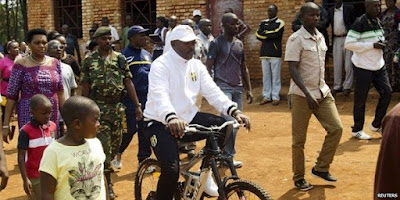"The masses have decided to take into their own hands the destiny
of the nation to remedy this unconstitutional environment into which Burundi
has been plunged.
"The masses vigorously and tenaciously reject President
Nkurunziza's third-term mandate... President Pierre Nkurunziza has been
relieved of his duties. The government is overthrown.".......Maj Gen Godefroid Niyombareh
These statements signalled a purported Coup d’état in which former Burundian army chief, Major General
Godefroid Niyombareh announced the overthrow of the government of Pierre
Nkurunziza
in May 2015. This came at a time of heightened
political tension amid waves of massive protests following the declaration of intent
by the Burundian leader to seek another term in office.
Pierre Nkurunziza’s first ascent to the helm of affairs in Burundi was
in 2005 following the promulgation of a power
sharing constitution. He was elected by a two-thirds majority of the
legislature for a five year term as the Country’s first post transition
president. Under the terms of the Constitution, subsequent presidential
elections were to be decided by Universal suffrage.
Upon the
expiration of his term in 2010, President Pierre Nkurunziza sought re-election for another term in
office. This time, he was elected by universal suffrage and then in 2015 as
his term in office expired, he sought another term following a declaration of
intent in April 2015. This ignited a coup de theatre; starting with mass protests against the President’s
decision in which over 70 people lost their lives and about
500 wounded as demonstrators
clashed with police in the weeks following the President’s declaration.
 |
| Burundian's Protests President Nkurunziza's Third term bid Source: bbcnews.com |
According to the United Nations High Commission for Refugees (UNHCR), over
100,000 fled across the Burundian border to neighbouring countries in
anticipation of more unrest to come. Their fears are not farfetched as the deal
that brought Pierre Nkurunziza to power was upon a peace deal long started
since 1995 and brokered by late former Presidents Nyerere of Tanzania and
Mandela of South Africa following years of civil conflict and genocides between
the Hutu and Tutsi ethnic groups. In fact, not until 2005 did the last of the
rebel factions sign the peace accord that calm returned to Burundi though there were skirmishes between government forces and FNL rebels in later years before
their final disarmament.
Backed by a favoured ruling by the Constitutional Court, though there were reports
of judges being intimidated President Nkurunziza asserted his claim that he had
only served only one term and that his first five year tenure in office did not
count as he was not elected by Universal suffrage. Following initial mass
protest against the president’s decision, the army seized the initiative to seize power in a coup d’état which ultimately failed.
Undeterred
by mass protests, opposition boycotts and condemnation from the international
community chiefly among which was the African Union who for the first time
refused to send observers to monitor elections in a member country, President
Nkurunziza merely approved election postponement by a few weeks from the
scheduled dates but went on to contest, winning by 70% of votes
cast.
 |
| President Nkurunziza enroute the polling booth to cast his ballot Source: bbcnews.com |
The last Burundian elections reverberated
fears of another simmering unrest in an already conflict laden Great Lakes region. Ever since the 2005 accord which brought Pierre Nkurunziza to power, there has been a clamp down on the
opposition and media restriction on political matters. Like the 2015 elections,
the 2010 Burundian Parliamentary Presidential elections was boycotted by the
opposition. The only difference this time was the opposition to President
Nkurunziza’s bid from his own party men and loyalists; Vice-President Gervais
Rufyikiri had to go on
exile after opposing President Nkurunziza's plans for a third term; Intelligence chief, Major General Godefroid
Niyombareh, himself a right hand man to the President during the hey days of
the CNDD FDD rebellion attempted to overthrow the government following his
opposition to the president’s bid and his subsequent sack from his post in the
Army.
 |
| President Nkurunziza set for another term in office Source:bbcnews.com |
Amidst opposition,
President Nkurunziza has been sworn in for another term in office and
Burundians face an uneasy calm. Though most of the dissenting voices against
the President from and without his circles are either in exile or behind bars,
a rebellion led by them against the government is very unlikely given the wariness
of all international actors to the continuing conflict in the Great lakes
region. However, President Nkurunziza might not have a smooth ride at
manipulation should he seek another term upon the expiration of this current
term. That will entail a constitutional amendment which might tamper with the
fragile peace the Country currently enjoys. Judging from the mass protests that
greeted the president’s current term bid, another tenure elongation will ignite
another conflict which might set the Tutsis who have now been long out of power
against President Nkurunziza’s Hutu ethnic group which has been in power since
2005 and will continue till 2020.


